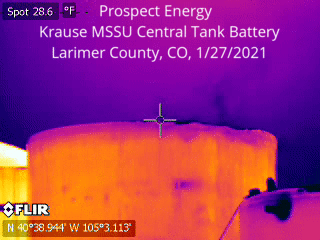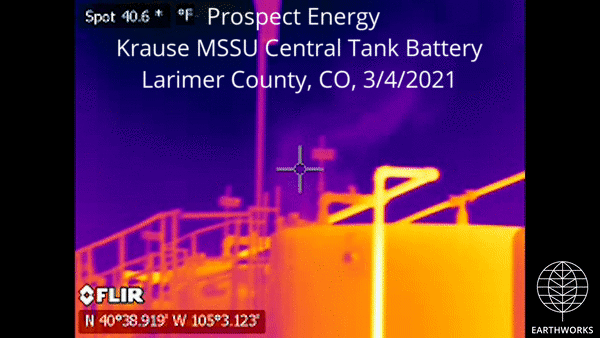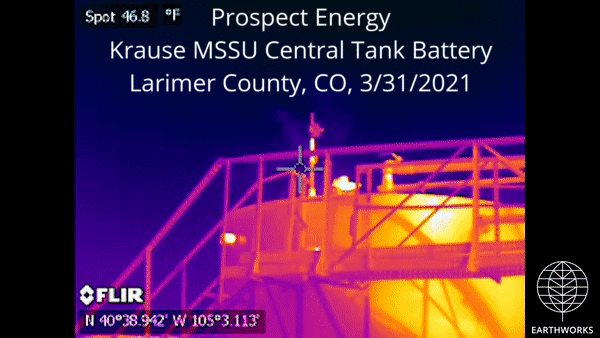Oil & gas pollution must stop in Colorado. The Polis administration has made promises, but to keep them the Colorado Department of Public Health and Environment (CDPHE) must do far, far better to protect health and climate.
This is a story of one chronic polluter in Colorado. This incident is not uncommon.
In January of this year, Earthworks investigated an oil and gas facility north of Fort Collins at the behest of a community member who was concerned about frequent odors and subsequent headaches.

At the site, our optical gas imaging (OGI) camera documented emissions from waste water storage tanks on site (often called “produced water” by industry).
Earthworks filed a complaint with the CDPHE and some of the community members did as well. This prompted an official investigation, which found the tanks to be in poor condition and leaking. The operator made repairs to the tanks and everyone celebrated a successful enforcement process. Except that it wasn’t…
The community members continued to smell odors and so, a month later, Earthworks revisited the site and found other leaking equipment–this time from a set of crude oil storage tanks on site. Our findings were confirmed by the CDPHE, and the operator again committed to make repairs.
Problem solved?

A few weeks later, doing our due diligence, Earthworks returned to the site. We found pollution emissions from the exact same crude oil tanks that CDPHE had confirmed were leaking and the operator committed to repair. We filed another complaint, CDPHE investigated, and the operator made additional repairs to the tanks between the time we visited and a CDPHE investigator arrived on site to look for leaks.
We looked at the site again a few weeks ago and, for the first time, found no emissions from the tanks. The community members also report that they have not been smelling odors or experiencing health impacts.
Subsequently, we have learned, through a CDPHE inspection report in 2019, that similar emissions from these tanks had been discovered in November 2018, June 2019, and October 2019, and that after the first two instances the operator failed to make the necessary repairs for months.
This case is illustrative of the size and scale of the oil and gas pollution problem in Colorado. The status quo of how industry operates is an existential threat to climate and a continuous harm to human health. Meanwhile, a lack of resources and slow-to-change culture of state regulators requires advocates and community members to work tirelessly to stop pollution from just a single source.
If CDPHE and the Polis administration want to demonstrate that their priority is the health and safety of Coloradans rather than business as usual for oil and gas, we suggest starting with an enforcement system that responds to community concerns with definitive, timely action to reduce harmful emissions.

